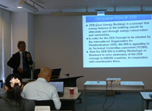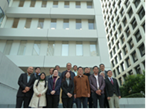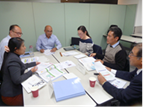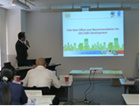Implementation of energy conservation training (ECAP20) for ASEAN countries
<Training in Japan>
Under the instruction and financial support of the Ministry of Economy, Trade and Industry (METI), the Energy Conservation Center, Japan (ECCJ) provided training in December 2019 to representatives in charge of divisions related to Building Energy Codes (BECs) and Green Building Codes (GBCs) from the governments of 10 ASEAN countries and from the ASEAN coordinator, the ASEAN Centre for Energy (ACE). The objective are as follows and the training has achived the expected results.
(1) To develop and refine the BECs/GBCs in each ASEAN country by studying the policies and Best Practices in Japan. Further, the technical measures for promoting ZEBs buildings are studied through the cooperation with the Japanese Business Alliance for Smart Energy Worldwide (JASE-W).
(2) To discuss the ZEB-Ready Building sub-category of the ASEAN Energy Awards (AEA) based on the case in the previous fiscal year in regard to the measures for increasing the number of case submissions and improving the selection process.
(3) To learn the know-how and countermeasures for developing and refining BECs/GBCs which correspond to the current situation in each country.
 |
 |
 |
 |
| Lectures (ECCJ/JASE-W) | Site visits | Group discussions | Final presentations by each country |
An overview of the training that was implemented during the five-day period between December 2 and 6, 2019 is as follows.
(1) From the country reports, common understanding was obtained regarding the necessity for developing action plans for the EE&C buildings in each country because conditions are different in each country in regard to the BECs/GBCs and ZEB promotion and implementation status.
(2) Concerning the information sharing (design, operation, EE&C evaluation-related tools, etc.) regarding the promotion of ZEBs in Japan, it was effectively and efficiently attained by studying ZEB-related specific technologies and excellent case examples through lectures and site visits. In particular, three types of site visits contributed to learn the know-how of the activities by typical private enterprises regarding the ZEB different standards (ZEB Oriented, ZEB Ready, and Net ZEB).
(3) From the JASE-W, advice was given regarding building planning, design, construction and operation, and information was shared relating to the international standardization of the ZEB Family Concept as a technical measure for realizing ZEB dissemination and promotion. As a result, the cooperation between ECCJ and ASEAN countries was greatly enhanced through the JASE-W activities.
(4) Only a small number of ZEB Ready cases were submitted for the AEA in 2019. Based on the fact that none of the cases were worthy of receiving an award, the following specific proposals were obtained as a result of holding discussions relating to specific improvement measures.
1) Following the example of Japan, ASEAN countries should not only consider ZEB Ready cases, but should also plan to concurrently introduce a ZEB Oriented category which will lead to further increases in the submission of cases.
2) To realize an increase in the number of case submissions, investigations should be made into mechanisms for enhancing support from a national policy point of view and for allowing judges who cannot participate in the AEA final selection meetings to participate online.

